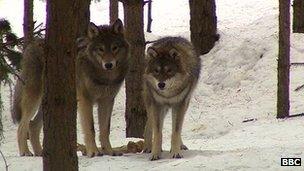Sweden wolf hunt suspended after legal challenge
- Published

A wolf hunt in Sweden that had angered environmentalists has been suspended, just days after it began.
The Swedish government had authorised what it called a targeted cull, saying it would create a healthier wolf population.
But it was suspended pending a full legal review after conservationists appealed to the courts.
Hunters killed three out of the 16 wolves allowed under the quota before the cull was called off.
Analysts say the court ruling is likely to result in no further wolf hunting in Sweden this year.
The decision to allow hunting had sparked a heated debate in Sweden.
The cull was supported by hunters and farmers, who say wolves deplete game such as elk and prey on sheep.
But it was opposed by environmentalists who argue that the predators should be allowed to roam free as part of the natural ecosystem.
The EU had also protested against the cull, saying it violated European law.
Wild menace?
It is estimated that more than 270 wolves are living in the wild in Sweden, much of which is covered by wilderness.
The species was hunted to the verge of extinction before a ban was introduced in the 1960s - before then, people were rewarded for killing wolves.
Limited culls resumed in 2010.
Sweden's environmental protection agency said the aim was to eliminate inbred wolves and improve the gene pool of the wild population, but conservationists dispute this.
"What is needed is not a hunt. We think it's flawed - it's to satisfy groups in Sweden who demand wolf hunting," Ann Dahlerus of the Swedish Carnivore Association told the BBC before the cull was suspended.
But farmers say that - in some areas - wolves are a real menace.
Anette Back-Olsson says 35 of her sheep have been killed over the years.
"From May to September, October, I don't sleep at night. I have dogs who bark when the wolf comes and I never feel safe," she says.
Farmers get compensation when their sheep are killed and conservationists say only 300 are taken by wolves each year - out of a total flock of around 800,000.